Text
Sending them VERY obvious hints for your birthday - Modern AU
Giving very obvious hints at what pet you want for your birthday.
Tags: Fluff, chaos on poppy's part (per usual).
Parings: Sebastian x reader, Ominis x reader, Garreth x reader, Leander x reader, Amit x reader, Natty x reader, Imelda x reader, Poppy x reader ...
Warnings: Ignore how i used MC first then switched to y/n. I was too lazy to go back and re-do them and fix it. 😭
Requested by this absolute angel @celestial--sapphic❤️❤️
(omg my first request on this im so excited <33)


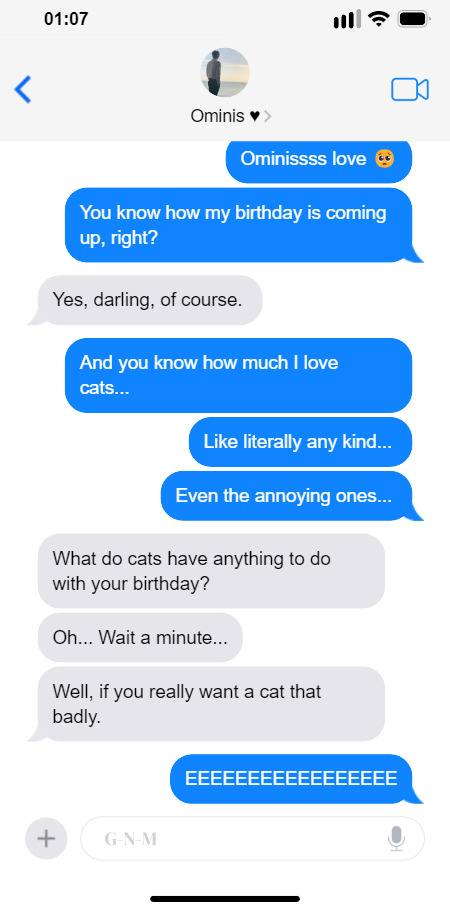
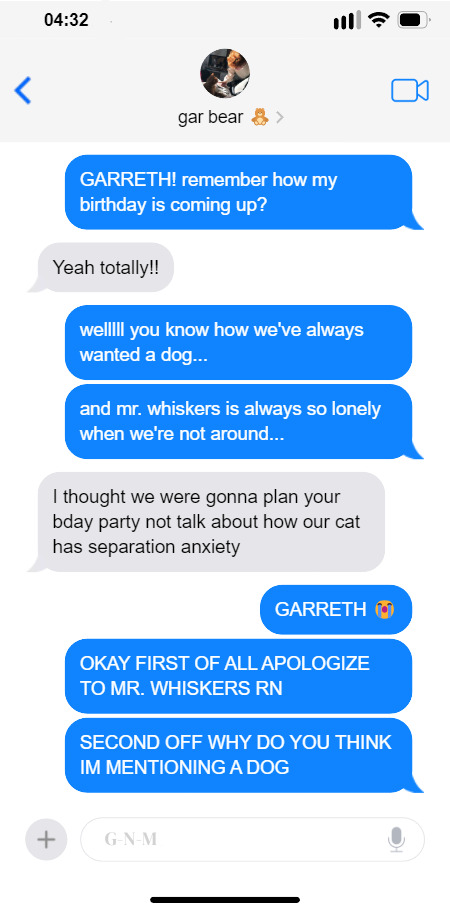




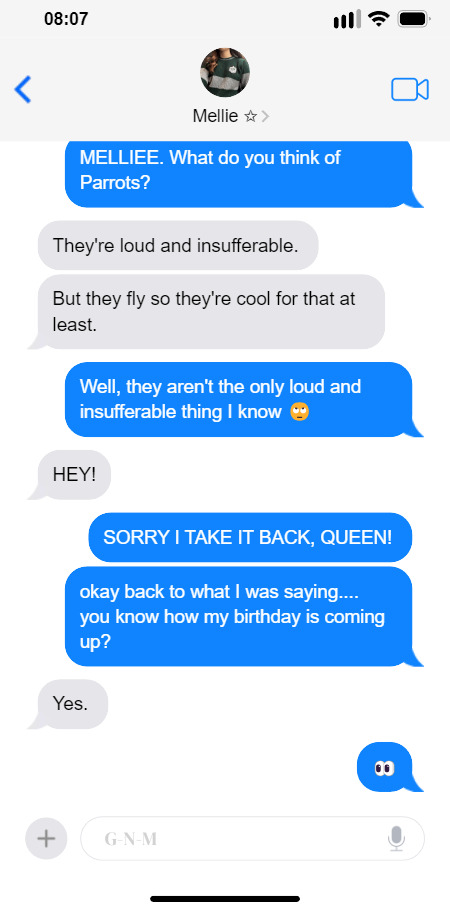
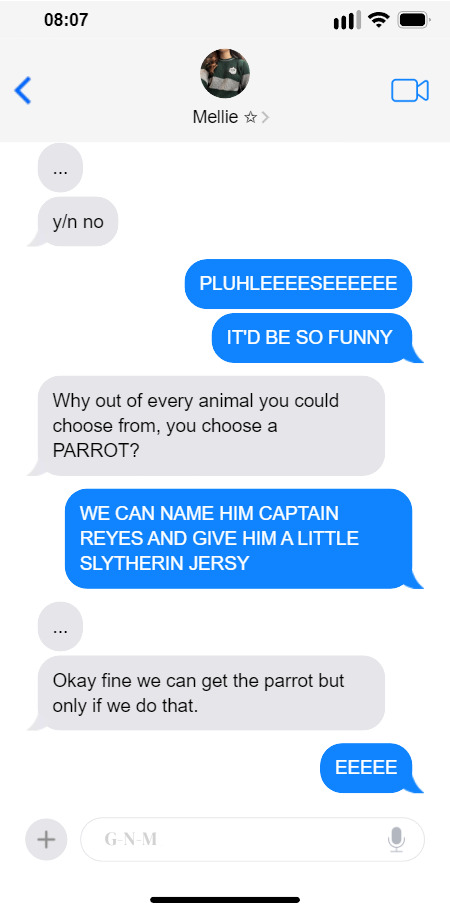
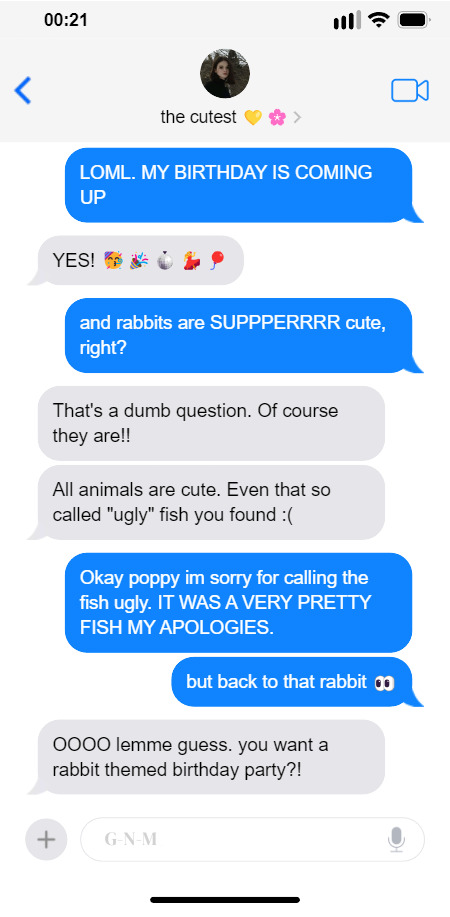
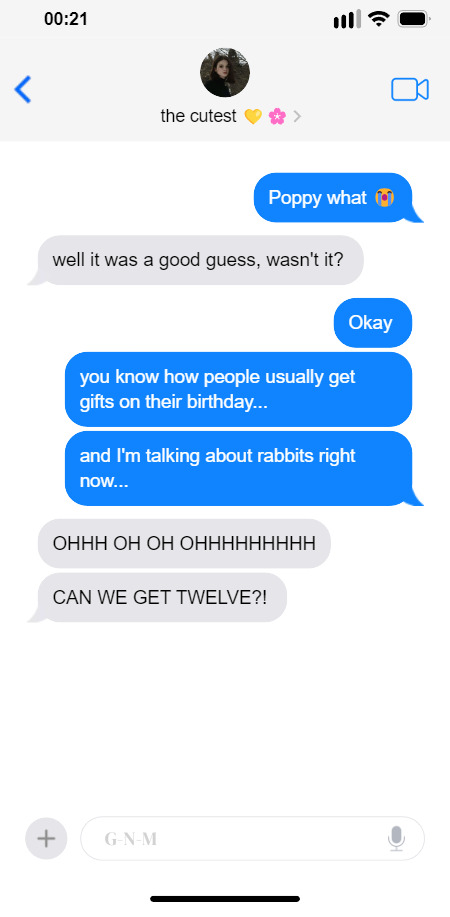
hope you enjoyed!! ❤️❤️
54 notes
·
View notes
Text
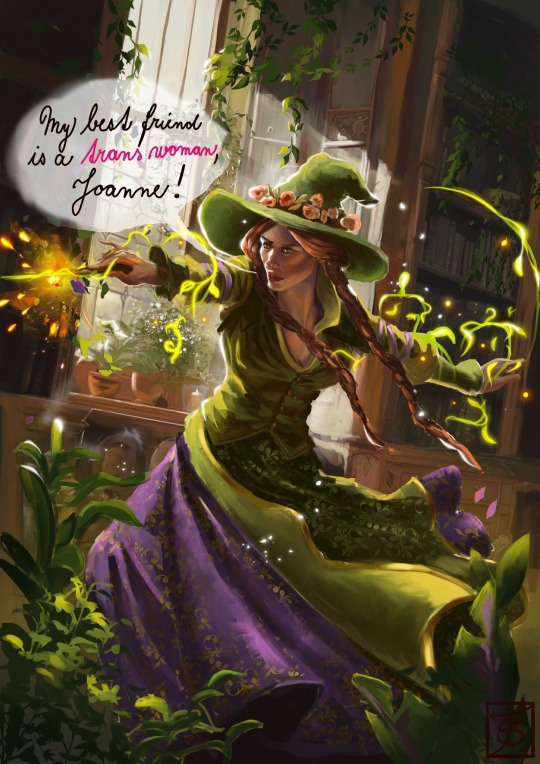
Professor of herbology has something to say. Mandrake potion a day helps to keep the TERFs away 🏳️⚧️!
96 notes
·
View notes
Text
her.

i think about canon lesbian mirabel every day of my life. my babygirl. loml.
131 notes
·
View notes
Text
#951: little bits about julia
I keep Julia's Deep Lore to myself and to a couple of moots but today would be a very special day to her. It's her day. She's a lesbian.
Stealing Borrowing the idea/format from @celestial--sapphic 👀
This -- is the edit I use as a brief overview of her:

And below the cut -- is a little dive into her personality.
Without indulging you into a lot of details, Julia was born in a family of a Dutch witch and a Faroese man, on a ship. When she was brought to Exeter and, eventually, adopted by a lovely yet somewhat cold Wright family after her parents died, the place left her with a feeling of strange, unknown loneliness. This family, these people; they wouldn't support her as her blood family would;
Julia was right in her assessment; she felt both flattered and terrified that a family of unfamiliar people took her in so willingly, gave her their last name. It was a sign she must've followed house rules and live as they would. That meant learning, a lot, if she wanted to ever leave Exeter; married off, preferably;
Wrights were never strict, however, you may absolutely call them a little funny for nudging on these Dutch people. If you will, a parallel with the Dursleys, except it was more of a running joke to remind Julia she might had have a family back in the Netherlands than ever an actual insult, yet;
Julia could feel it whenever the Wrights painted British people as morally and or decently superior. Julia remembered her previous life poorly but a comment like this always painfully irked her, especially when the Wright's son would do a verbal jab;
It became worse when she became older, around 14-15. She started noticing changes. At school, when other girls were sniggering about the boys, Julia wasn't interested in them. She was rather captivated with her classmates in lieu. And she was judgy of her adoptive brother's choices;
However, the realisation to why she was so invested in observing the classmates and indulging in these silly talks with the brother came to her much later, at Hogwarts;
At Hogwarts, she had an identity crisis, a housing crisis, a very-much-requited love story trope with Poppy, an orientation crisis, another housing crisis -- overall, she is a disaster lesbian except the disaster quite fancies her herself lmao and always tries to handle her more horribles to handle. Such as, The Bureaucracy Arc (@thriftstorebabayaga the one where she was fighting tooth and nail to have a plot of land to her name, got into a habit of smoking, caused Aesop a few grey hairs, and married Imelda);
When she's older, she's all over the butch--femme spectrum. Julia wants to be a chaotic lesbian gremlin until she finds herself and she succeeds at it, somewhat, greatly confusing everyone in the process, herself included;
Her only certainty is boobs;
I personally see her as a butch it rhymes with dutch IM SORRY, by how she often over-commits to whichever cause or task, challenge or deed; I tell you what, her older self has Anne Lister's rizz;
Julia was never able to come out to the Wrights except to their son. He isn't understanding of her in the slightest but he believes it doesn't matter for as long as Julia is happy, he accepts her anyway.
It isn't all but if I continue I might never get up from the puter.
6 notes
·
View notes
Text
Get to know Evelyn Caddel: Lesbian headcanons

Just some silly little thoughts about Evelyn and her lesbian identity for Lesbian Visibility Day 💚
You can also see my previous post for Lesbian Visibility Day (which is just silly Evelyn/Hogwarts Legacy memes) here
When she was little and played pretend with her friends (usually ‘mommy and daddy’ type games) she was always more than happy to play the dad. Once she drew a little moustache on her upper lip with an ink fountain pen to complete the role. Her Aunt Marianne blew her top when she saw it and immediately made Evelyn scrub it off.
Living at her aunt’s pub, which was a watering hole for queers and outcasts in and around Islington, she realised very young that men can court men and women can court women but – at the same time – that it was not accepted by society at all. By the time she was a teenager she had seen plenty of their regular customers being verbally abused and attacked outside the venue, often by the police who arrested male clientele. (For historical reference, the Offences Against the Person Act 1861 repealed the death penalty for homosexual acts but instead created harsh prison terms, you can read about that here.)
Her first real crush was a regular at the pub called Catherine. Catherine was quite a few years older (and very unlucky in love), Evelyn was down hard. Definitely one of those unrequited loves where you are infatuated with the older, cool person who is just way too cool for you and just sees you as a younger sibling/pal.
Evelyn falls on the scale of soft butch. Growing up her aunt often made her wear skirts and dresses (never trousers). Her first morning at Hogwarts she forgoes the skirt she was given at the sorting ceremony and puts on a pair of tartan, three-quarter breeches. They feel like freedom.
Seeing queer couples being so out and open at Hogwarts took a bit of adjustment. Everytime a couple walked past her hand in hand or kissed in public she felt the nauseous worry that someone would shout a slur or hurt them but no one ever did, not even the bullies who picked on ‘mudbloods’.
She doesn’t have to come out to anyone, as non-heterosexual sexuality is completely normal and accepted. However, that does not immediately erase the lifelong anxiety and shame she felt deep inside herself, meaning she ended up crying a little on her first date with Poppy. (If you fancy finding more about the context of that you can read it in chapter one of my fic…)
“By the time she turned 15 she had just accepted she would have a life living in the shadows, her burden to bear; relationships with women confined to dark, private spaces, like her aunt’s pub or more sordid venues. But that was before Professor Fig arrived, before Hogwarts, before meeting Nora Treadwell down by Lower Hogsfield and learning she was a witch with a wife.” ← this is a quote from Chapter Three.
Sebastian, for example, realised early on in fifth year that Evelyn definitely batted for the other team for a number of reasons, without her even saying a word: One) After a Crossed Wands match Constance Dagworth came over and praised her for how quick she was picking duelling up and she blushed through the entire conversation and couldn’t maintain eye-contact. Two) After her first Herbology lesson she couldn’t stop talking about how pretty Professor Garlick’s hair is (sure hun, just that). Three) she didn’t believe Imelda at all when she mentioned off-hand how loads of girls fancy Professor Sharp.
She is useless around pretty girls. Mind goes blank, no thoughts. A true Lesbian Girlfailure.
Evelyn doesn’t necessarily have a type, although she does lean more towards femme girls. She can’t resist someone who is completely, unwaveringly passionate and driven about a topic they love (*cough cough* Poppy and beasts *cough cough*). She often thought, if she liked boys, Amit would be a perfect match for her.
That being said, she is 110% a boob girl.
15 notes
·
View notes
Text
Julia would foam at the mouth when asking for her skin care routine only to heard Herbology one-liners and then learn smth smth Potions uh-huh smth smth Ingredients, ok so PROFESSOR SHARP THERE YOU ARE I AM DESCENDED DOWN THERE TO PESTER YOU AS PER MY LATE FIRST-YEAR-SHIP ALLOWS--.
Nobody is safe. Tell that girl everything she wants to know, she will never get tired enough not to ask things.


Hands 👁️👁️
25 notes
·
View notes
Text
yesyesyesyesyesyes
So, Imelda Reyes is probably Spanish/ has Spanish origin, right?
I can imagine she speaks Spanish with the most sweet, warm accent when she is with her parents, or close friends, or partners or why not, her future children?
And then angry Scottish noises with the other people.
[insert here Gordon Ramsey meme]
15 notes
·
View notes
Text
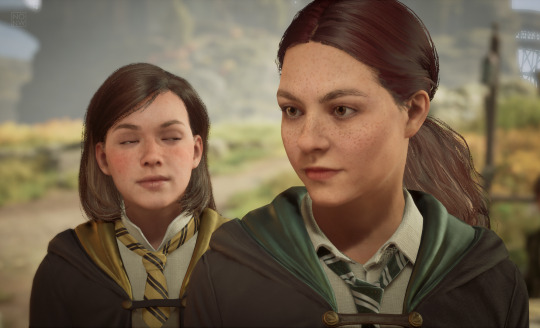
(¬_¬) (・_・ )
19 notes
·
View notes
Text
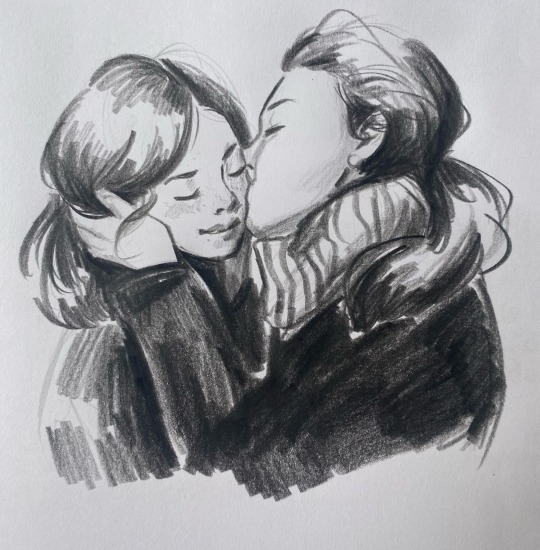
Imelda and Poppy 🤧🥰♥️
43 notes
·
View notes
Note
wait how bougie was Tom Riddle Sr.? How nice would his Manor have been? Was he like an actually Lord with a title and stuff?
thank you very much for the ask, anon!
in half-blood prince, dumbledore refers to tom riddle sr. as "the squire's son" - which allows us to state with certainty that he was a minor aristocrat.
however, the word minor is important here.
there are - historically - two levels of aristocracy in britain. the first are the peers of the realm - which refers to families which hold one or more of the titles of duke, marquess, earl, or viscount. these are the elite of the elite - these gradations of nobility were created in the middle ages as a way of distinguishing those who held the titles from other noblemen, usually because of a close relationship [often one of blood or marriage or both] to the king.
the titles are hereditary by male primogeniture, and the holders - while this is no longer the case - used to have political power [such as the right to sit in the house of lords], simply by virtue of their birth.
[this is why they're called "peers" - it refers to them historically being close in status to royalty, and therefore expected to serve as royal advisors.]
there is another class of peer - a baronet - whose title is similarly hereditary, but whose position doesn't come historically with the right to sit in the lords or advise the king by virtue of birth. [baronets may - of course - have been members of parliament, or royal advisors selected at the king's discretion, but this would be separate from their title. a duke, in contrast, could historically expect to request a meeting with the king simply because he was a duke.]
while some families have historically been ennobled at the king's discretion, access to any of these titles is pretty much restricted to the small group of families who've held them for centuries.
but below the peers of the realm, there is a second, more minor class of aristocracy, the landed gentry - of which a village squire is a textbook example.
historically, what is meant by "landed" is an ability to live off of the rental income of one's country holdings, which would be leased to tenant farmers. that is, they are landlords in the original sense of the term - lords of the land. this is what tom sr. tells us his family does in half-blood prince:
“It’s not ours,” said a young man’s voice. “Everything on the other side of the valley belongs to us, but that cottage belongs to an old tramp called Gaunt, and his children. The son’s quite mad, you should hear some of the stories they tell in the village - ”
what is also meant by "landed" is that the family in question is of the upper-classes, but that they are still "commoners" - which in this context doesn't imply a value judgement, but which is a socio-legal term which simply indicates that they don't hold an aristocratic title such as duke, earl etc.
[and gentry families certainly aren't common in terms of financial standing... the most famous member of this class in literature? fitzwilliam darcy, whose ten thousand a year is something like thirteen million quid in today's money...]
gentry families might be very old - they might have received their lands from the king in the middle ages as a reward for knightly service, and it's interesting to imagine generations of gaunts and riddles brought up alongside each other in little hangleton - or they might be comparatively newer - tom sr.'s great-grandfather [feasibly born c.1810] could have been a self-made victorian industrialist who bought the lands from the original holder and established himself as gentry.
by 1900, it was becoming much harder for the gentry to live on rental income alone, and many would also have had jobs. these would have been elite, and very frequently were in politics, the civil service, the military, or the law. tom sr's father - whom the films call thomas, so let's go with that - might, for example, have served as a high-ranking officer in the army [including during the first world war], be the local magistrate, or be the local member of parliament.
in terms of titles, thomas riddle would almost undoubtedly be sir thomas - and this is how it would be correct to address him. but this title would be a courtesy, and it wouldn't be hereditary unless the riddles were also baronets [which it's entirely plausible that they were].
which is to say, tom sr. would not have a title while his father was alive - although he would have the right to be referred to formally in writing as mr thomas riddle esq. [esquire]. the correct form of verbal address for anyone other than friends and family would be to call him mr riddle, although the riddles' servants would probably refer to him as mister tom.
tom jr. would not have a title while his father or grandfather was alive. if the riddles were baronets, he would technically inherit the title after he kills the rest of the male line... but given that tom sr. never acknowledged him and his existence was presumably unknown to the riddles' lawyers this wouldn't be something which happened in reality. the estate's executors clearly took control of the riddles' property, the land was portioned off and sold, and the house became a standalone property for sale.
the riddle house - which is a name used informally for it in little hangleton, it would have a different "proper" name - is described in canon in ways which show that it's a typical manor house, which means it would look something like this:
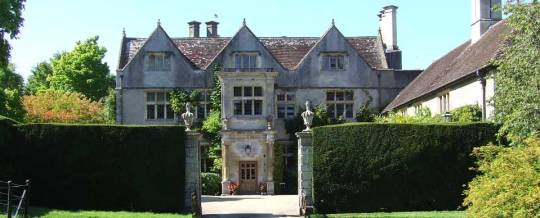
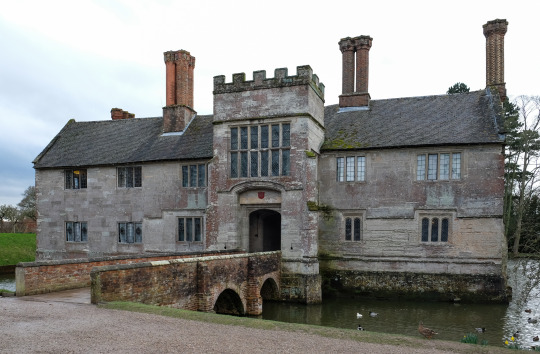
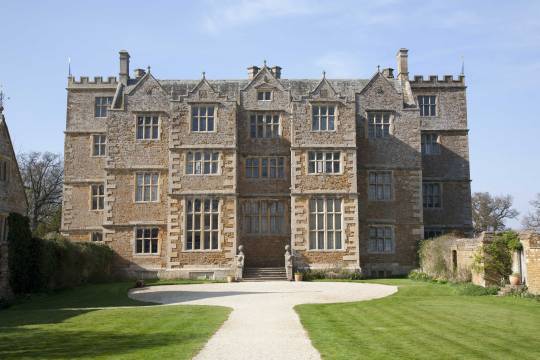
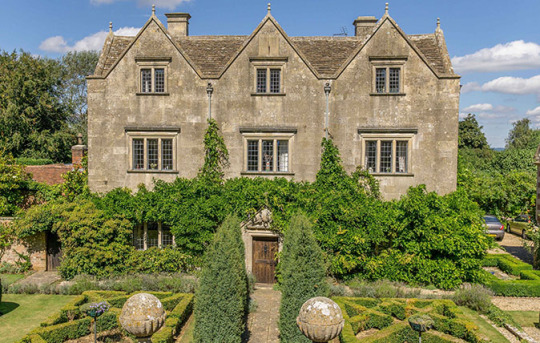
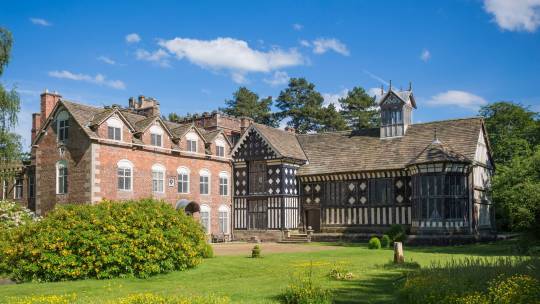
these houses are obviously very impressive, but they're tiny in size in comparison to the magnificent stately homes - places like blenheim palace, chatsworth, burghley house, holkham hall - lived in by the titled aristocracy. the riddles would entertain - for example - by giving house parties, dinner parties, hunting parties, etc., but they wouldn't have a ballroom or a dining hall capable of seating hundreds.
[they would probably also own a property - probably a flat or small house - in london.]
they would have servants, but not colossal numbers - they would undoubtedly have a butler but not footmen, and the upstairs maids would report to the butler since they probably wouldn't have a housekeeper. they canonically have a cook, who probably had one or two kitchen maids assisting, and they canonically have a gardener - frank bryce - who probably doesn't have any assistants. they may, depending on the size of the estate, have a gamekeeper. sir thomas undoubtedly had a secretary and a chauffeur, and his wife might have a lady's maid. tom sr. would have had a nanny and then been educated until at least the age of eight by a governess, but would then have attended a prep school [either day or boarding] until the age of thirteen, and then gone to a boarding school, from which he likely went on [on the basis of social class rather than talent] to oxford or cambridge.
the family would have enormous social influence locally. most people - and also businesses - in little hangleton would be their tenants, and they would also probably have a say over the appointment of the local clergyman [an important figure in the community in the nineteenth and early twentieth centuries], since the parish church is likely to have been something called a "living" - the thing which turns up again and again in jane austen - which means that the church and its parsonage technically belongs to the landowner, but is granted to the vicar as a freehold while he's in post.
gossip about the riddles' doings would also be the main source of local interest - the servants were dining out for months on tom sr.'s elopement and return.
so they're something resembling celebrities - but they're local celebrities. nobody in london - and even nobody in cities we can imagine are nearer to little hangleton, such as liverpool, would particularly know or care who they were. tom sr. might have made it into the london gossip columns if he was part of a particularly scandalous "set" [a group of friends] who socialised in the capital, but these mentions would have been fleeting - and the press would have been much more concerned by the doings of members of his set who were genuinely titled or who were legitimately famous.
[this is the reason why mrs cole doesn't recognise the name. if merope had said her son was to be named cecil beaton after his father, she may well have been prompted to hunt him down...]
so tom sr. is elite - but he's elite in a way which is extremely culturally-specific, and which is [just like the portrayal of aristocracy in the wizarding world - the blacks, for example, are far less aristocratic than the riddles in terms of canonical vibe] often exaggerated into the sort of pseudo-royal grand aristocracy which the british period-drama-industrial-complex makes such a big deal of.
and tom jr.'s character is affected by this in a series of extremely interesting ways.
by which i mean that, in terms of blood, he's probably the most aristocratic character in the series - the absence of grand aristocracy in the wizarding world would mean that [were he raised by his father] he would come from a social background which was equivalent [even as it was divided from them by virtue of being muggle] to any of his fellow slytherins, and would help him easily blend into their society because the manners, genre of socio-cultural reference points [he would recognise, for example, that quidditch heavily resembles both rugby and polo], accent and way of speaking etc. that he would possess would be broadly indistinguishable from those of his pureblood peers.
[this is why justin finch-fletchley and draco malfoy speak in essentially the same way.]
but he would then be given the enormous boost in cachet - one which would genuinely elevate him above the rest of cohort - of his maternal line.
and we see in canon that this does bestow some privilege on him among his peers while he's in school:
Tom Riddle merely smiled as the others laughed again. Harry noticed that he was by no means the eldest of the group of boys, but that they all seemed to look to him as their leader.
“I don’t know that politics would suit me, sir,” he said when the laughter had died away. “I don’t have the right kind of background, for one thing.”
A couple of the boys around him smirked at each other. Harry was sure they were enjoying a private joke, undoubtedly about what they knew, or suspected, regarding their gang leader’s famous ancestor.
where he's let down socially is that people like slughorn - to whom he can't reveal his slytherin ancestry and hope to maintain cover for his wrongdoing - don't think he's come from anywhere particularly special. this is because he has a muggle father - absolutely - but it's even more that he has a muggle father who, since he left him to be raised in an orphanage, was presumably working-class.
what the young voldemort lacks is any socio-cultural familiarity with the muggle class performance which the class performance of the wizarding world parallels. abraxas malfoy boasting about how important his father is would be something a tom jr. raised by the riddles could match - "oh yes, my father gives to all sorts of causes too. in fact, he was invited to buckingham palace because of it." - establishing himself as an equal in terms of class and social influence even if he isn't an equal in blood.
what actually happens in canon is that the orphaned tom - with his uncouth manners and his working-class accent - has no hope of gaining any sort of social equality with his posh peers.
so he becomes determined to outrank - and humiliate and control - them.
70 notes
·
View notes
Note
Riddle’s extremely fearful and aggressive reaction to Dumbledore when he thinks he’s a doctor (and the fact that he assumes this at all and believes he is being lied to) has some pretty dark implications (which of course no one follows up on). Do you have thoughts?
thank you very much for the ask, anon!
and yes - this has occurred to me too... which means that my thoughts come with a trigger warning for the sexual abuse of a child, and are under the cut.
the relevant scene in canon is, of course, this:
“I am Professor Dumbledore.”
“Professor?” repeated Riddle. He looked wary. “Is that like doctor? What are you here for? Did she get you in to have a look at me?”
He was pointing at the door through which Mrs. Cole had just left.
“No, no,” said Dumbledore, smiling.
“I don’t believe you,” said Riddle. “She wants me looked at, doesn’t she? Tell the truth!”
He spoke the last three words with a ringing force that was almost shocking. It was a command, and it sounded as though he had given it many times before. His eyes had widened and he was glaring at Dumbledore, who made no response except to continue smiling pleasantly. After a few seconds Riddle stopped glaring, though he looked, if anything, warier still.
“Who are you?”
“I have told you. My name is Professor Dumbledore and I work at a school called Hogwarts. I have come to offer you a place at my school - your new school, if you would like to come.”
Riddle’s reaction to this was most surprising. He leapt from the bed and backed away from Dumbledore, looking furious.
“You can’t kid me! The asylum, that’s where you’re from, isn’t it? ‘Professor,’ yes, of course - well, I’m not going, see? That old cat’s the one who should be in the asylum. I never did anything to little Amy Benson or Dennis Bishop, and you can ask them, they’ll tell you!”
the surface-level reading of this scene - which is clearly what the text wants us to go for - is that riddle thinks he's about to be institutionalised for being "mad" - and, specifically, that he thinks that what dumbledore has been told is his "madness" is actually his magic.
[he is also clearly meant to be read as panicking a little bit that he's fucked around torturing his fellow children and is now about to find out...]
that riddle accepts he's a wizard so easily - and that he is so reassured by dumbledore agreeing that he's not mad - is something the text wants us to read as sinister. him immediately describing himself as "special" is set up as a precursor to the adult voldemort's delusions of grandeur - which the entire arc of the series, ending in his death as an ordinary man, is designed to undermine.
but i've always disliked this reading. the eleven-year-old riddle - a magical child raised around non-magical people - is objectively correct to describe his powers as "special" [in that they make him identifiably different from the crowd] within the context in which he lives. the word choice is nowhere near as deep as dumbledore decides - he's clearly known since he was very young that he's a wizard, but he didn't have the precise language to describe this fundamental part of himself until dumbledore offered it; prior to that, "special" is a perfectly reasonable alternative term.
and, in always knowing that he's a wizard, he also knows that he doesn't have a mental illness - but he must also know that this is something it's near impossible for him to prove.
in the real world, if i spoke to a patient who told me:
“I can make things move without touching them. I can make animals do what I want them to do, without training them. I can make bad things happen to people who annoy me. I can make them hurt if I want to.”
then i would be correct to describe them as experiencing psychosis. and i might - depending on their other symptoms - have reasonable cause to admit them [voluntarily or not] for psychiatric treatment.
riddle is - of course - demonstrably not psychotic. but it's not unreasonable that mrs cole would assume he is - the world she lives in, as a muggle [even if she's a religious one], is one in which people do not possess the ability to move objects or control animals with their minds, and if one of her charges is convinced that he can, then she's justified in seeking medical intervention.
[that psychiatric treatment in the 1930s can be described without exaggeration as inhumane is another matter...]
which is to say, i think we can easily suppose that mrs cole has - prior to dumbledore's arrival - succeeded in having riddle "looked at", and that the idea that he's mentally ill and should be committed to an asylum has been mentioned before. i think most of us would be instinctively [and angrily] wary of doctors if this happened to us, regardless of how nice the doctors in question were.
and maybe that's all there is to it.
and maybe it isn't...
in the doylist text, the eleven-year-old riddle's personality is the way it is because he's the villain of the series. where harry is preternaturally capable, even as a child, of all the things the series defines as admirable - above all, enduring difficulty without complaint - riddle is preternaturally incapable of them. he's meant to come across as unambiguously sinister - and the fact that the text repeatedly emphasises that he has control over his unpleasant traits invites us to view him as someone who is acting with full agency. that he lives in an orphanage is a trope which the text uses, like a campy horror film might, predominately to underscore how creepy he is - and the text, in keeping with its general lack of interest in states and their institutions, never really prompts us to interrogate the impact of his childhood upon the course his life takes.
[this is despite the fact that voldemort's reliving of the night he killed the potters in deathly hallows is an incredibly accurate depiction of ptsd...]
but it's also the case that the eleven-year-old riddle's behaviour and personality fits a pattern we might expect to see in a child who is being abused, sexually or otherwise:
he's aggressive, he has a hair-trigger temper, and he becomes distressed even by behaviour - such as dumbledore speaking mildly and calmly - which would not ordinarily be expected to provoke such a reaction.
his broader emotional state is fractious. his mood changes sharply, he seems to feel emotions very profoundly, he struggles to control his emotional response to things, he's extremely easily irritated, he's attention-seeking - and he particularly seeks negative attention, and he's very highly-strung.
his admission in deathly hallows that he feels calm before he kills - or before he otherwise eradicates a threat or a problem - comes with the flip-side that he's someone who appears, when things aren't going well or he finds himself in a situation which he can't control, to become quite anxious. which is a trauma response.
he's extremely isolated. the text presents the fact that he has no friends as a deliberate choice - "lord voldemort has never had a friend, nor do i believe that he has ever wanted one" - and his relationship with everyone else he ever meets, including his fellow orphans, as defined by the text as exclusively involving him controlling, manipulating, and punishing them. or: he is always the more powerful person in the pairing.
but this need for control can be read as self-protective just as easily as it can be read as sinister. there are hints in canon that riddle is not just some malevolent force in the orphanage preying on mild-mannered innocents. for example, billy stubbs, the owner of the rabbit he kills, is targeted by riddle as revenge:
“Billy Stubbs’s rabbit... well, Tom said he didn’t do it and I don’t see how he could have done, but even so, it didn’t hang itself from the rafters, did it? [...] But I’m jiggered if I know how he got up there to do it. All I know is he and Billy had argued the day before."
on the rare occasions billy turns up in fics, he's usually - i find - written very like neville - sweet and guileless and a bit pathetic. but the alternative reading - especially when we take into account that riddle attacks the rabbit rather than billy himself - is that billy is someone he would be afraid to physically confront.
indeed, it's striking that voldemort - at all stages of his life - is described as being quite physically fragile. not only is he very thin, but he's always cold and his heartbeat is described several times in canon as irregular. i think this is supposed to be a comment on the physical changes he undergoes the more horcruxes he makes - although the idea that the soul would affect the heart doesn't actually align with how the series understands the soul to relate to the body - but it can also be interpreted perfectly legitimately as something he was experiencing prior to splitting his soul.
i am committed to the headcanon that riddle was quite a sickly child - and that this is one of the things which drives his fear of death - and i'm also committed to the idea that his obsession with magic is because the enormity of his magical power makes up for his physical lack. he can defeat - and humiliate and frighten and remove the threat of - billy or dennis [or even an adult man?] with magic. without it, if they were to physically overpower him, then he wouldn't be able to throw them off.
he is extremely nervous about being alone in a room with dumbledore - someone he doesn't know, and who he assumes is connected to a profession [and, maybe, who knows any other doctors he's been previously made to see...] of which he is frightened.
he doesn't trust or confide in anyone - which, as a child, means particularly that he doesn't trust or confide in adults in positions of responsibility. he's clearly uneasy with the idea of finding himself in the subordinate position in an adult-child relationship when dumbledore offers to take him shopping for school supplies - potentially because he's worried that dumbledore will try and dictate or restrict what he's allowed to buy unless he behaves in a certain way...
and i am always very struck that dumbledore says in half-blood prince:
"He was very guarded with me; he felt, I am sure, that in the thrill of discovering his true identity he had told me a little too much. He was careful never to reveal as much again."
this is presented in the text as evidence that dumbledore is the only person of whom voldemort is afraid - by which the text means that voldemort acknowledges that dumbledore knows that an ordinary man, mortal and unimpressive, lurks behind the mask of unassailable power he has created for himself; and which the text thinks is a good thing.
but we can also read it as a self-protective act on riddle's part. in his excitement, he offers dumbledore information [that he is known to be a liar, that he is in trouble a lot, that mrs cole dislikes him and is disinclined to believe anything he says] which would give dumbledore - or anyone in a similar position of power and presumed respectability - cover to abuse him, safe in the knowledge that he would be unlikely to be believed if he reported it.
he doesn't appear to feel safe in the orphanage and he's frequently absent from it - by his own admission, he spends a huge amount of time wandering around london on his own, which may even involve him staying away for several days at a time. nobody appears to notice or care about this.
he's very independent - which the text again presents as evidence of his deliberate self-isolation and rejection of the bonds of love and friendship - and his independence is unusual for a child his age [i.e. that he is capable of doing all his own shopping for school].
his knowledge of violence - i.e. how he designs the trip to the cave to be maximally psychologically devastating for dennis and amy and devoid of repercussions for himself - is also more advanced and methodical than would be expected in a child of his age. again, the text uses this to emphasise how inextricable the child-voldemort is from his adult self - and also, to some extent, to underscore the intellectual brilliance [his magic is also more advanced than is normal for a child] which his narrative archetype [the exceptional villain who is defeated by the everyman hero] requires.
but we can also read it as evidence of his own victimisation.
a common sign that a child is being sexually abused is that they display a knowledge of sexual behaviour which is more advanced than is reasonable for a child of their age - for example, knowing in detail how a sex act is performed, or fluently using sexual slang which they have no chance of knowing either from age-appropriate settings like school-based sex education or conversations with a parent or trusted adult, or from the sort of enthusiastic hoarding of rude words and phrases all children enjoy as they grow up.
riddle's precise, clinical knowledge of how to manipulate, frighten, torture, and control can be seen as something similar. if he can - at eleven or younger - methodically break down another child until they're "never quite right" again, then this is because he's learned how to from someone.
he keeps secrets.
and he also goes out of his way to extract them. his grooming of ginny in chamber of secrets - he manipulates her into confiding things she wants to keep to herself, promises he won't tell anyone, and then uses the threat that he will to get her to do his bidding - is an absolutely textbook example of how abusers use the idea of secrecy to control their victims. it doesn't make his abuse of ginny any less inexcusable if we assume he learns this from being on the other side of things.
dumbledore understands his little cache of objects as trophies he's taken from victims - and the text takes the view that dumbledore is correct in this assessment. that hoarding trophies is something widely associated with serial killers means that this is yet another thing which underlines how creepy - and how like his adult self - the child-voldemort is.
but it's also the case that the adult - and teenage - voldemort places a lot of emphasis on gift-giving as part of his control over other people. the two most obvious examples in canon are wormtail being given his shiny hand as a reward for helping voldemort get his body back, and slughorn being buttered up with crystallised pineapple before voldemort asks him about horcruxes.
the text thinks this is sinister - and one of the reasons it does this is because gift-giving is a grooming tactic.
the text also clearly thinks this isn't behaviour voldemort has learned from the other side.
and yet a common sign that a child is being abused is if they have possessions it doesn't make sense for them to own [i.e. a child from a low-income background who is suddenly decked in designer clothes] and which they can't or won't explain how they came by. riddle's cache isn't luxurious - although he's so poor that a yoyo or a mouth organ probably is a luxury to him - but there's also nothing in canon which precludes the objects being presents, rather than stolen goods.
if the spell dumbledore uses to make the box rattle is caused by a statement which is both relatively ambiguous and dependent on dumbledore's subjective personal morality - is there anything in this room he's acquired through nefarious means? - then the spell would still work as it does in canon if riddle was an abuse victim given the objects as "rewards". dumbledore's tendency to locate right and wrong in the individual and dumbledore's belief that good people should steadfastly endure misery means he can be written entirely canon-coherently as someone who would think a victim who appeared to collude in their own abuse - such as a victim who "offered" a sexual act because their abuser promised them something if they did - was behaving consensually, manipulatively, and nefariously.
and it's worth noting that when riddle doesn't know what dumbledore has done to make the box rattle, he is "unnerved". when he realises dumbledore thinks he's stolen the objects - and that he has no interest in forcing him to admit this aloud - he is "unabashed". perhaps because he's just received proof that an experience he doesn't want to talk about is still secret...
on the other hand, the objects could indeed be stolen - because petty criminality and anti-social behaviour, especially in pre-teen children, is also a sign of abuse.
he can be extremely obsequious - when dumbledore tells him to watch how he speaks he becomes "unrecognisably polite", he ruthlessly flatters slughorn, and he is cringingly deferential to hepzibah smith.
the text understands this as evidence that his apparent charm is only superficial - another trait associated in the popular imagination with serial killers [and it's striking that so much about the young voldemort - handsome, charming, seemingly quiet and polite, true evil lurking underneath the mask - is exactly like the pop-culture persona which has been created for ted bundy...].
voldemort himself agrees that his charm is performative in chamber of secrets:
“If I say it myself, Harry, I’ve always been able to charm the people I needed. So Ginny poured out her soul to me, and her soul happened to be exactly what I wanted."
but his obsequiousness is also a fawn response - a way of minimising a threat by attempting to please the person issuing it. he becomes "unrecognisably polite" - after all - in response to this:
Dumbledore raised his eyebrows. “If, as I take it, you are accepting your place at Hogwarts - ”
“Of course I am!”
“Then you will address me as ‘Professor’ or ‘sir.’ ”
Riddle’s expression hardened for the most fleeting moment before he said, in an unrecognisably polite voice, “I’m sorry, sir. I meant - please, Professor, could you show me - ?”
riddle could reasonably interpret what dumbledore says here as a threat to prevent him attending hogwarts - even though dumbledore evidently doesn't mean it in this way - and he switches to being fawning because this is something he really doesn't want to happen...
do i think that any of this is what the text was actually going for? no. and nor do i think that reading riddle as a victim of abuse excuses the violence which the adult voldemort goes on to perpetuate.
but i think it is a reading of his characterisation which is both canon-plausible and interesting - a strange, sickly child with a reputation for cruelty and dishonesty being abused by the respectable doctor who is constantly called in to treat his coughs and wheezes, who buys him little presents and charms him into telling him secrets, who then [to paraphrase the teenage voldemort] feeds him a few secrets of his own, safe in the knowledge that nobody will ever believe him if he tries to get help.
and i also think this a reading which is sincerely important.
a significant contributor to the prevalence of child abuse - no matter what exact form this abuse takes - is that we are culturally conditioned to imagine that both the abuser and the victim will look and behave in a certain way if the abuse is "real".
and this means, all too often, that we take child abuse more seriously when the victim is "sympathetic" - when they're from a stable home, and their family are respectable, and they do well in school, and they're polite and sweet, and they look innocent, and they behave perfectly appropriately for their age, and nobody would ever dare to say that they come across as older than they are, and they're white, and they don't have a history of lying, and they don't have a history of attention-seeking, and they don't have a criminal record, and they're not abusive themselves, and there's absolutely no way of suggesting that they colluded in their abuse, and the perpetrator was someone who looks like a child abuser.
someone who is creepy, low-status, ugly, unpopular. someone who everyone can tell is socially abnormal, someone who nobody would ever intentionally permit to be around their children. not someone who is charming, well-respected, attractive, rich, popular, trustworthy. not someone who has a loving family and a happy home. not someone we might be friends with.
but many perpetrators of child abuse are these second group of people. and many victims of child abuse are "unsympathetic", when their social positions and reputations are compared to their abusers' own.
they lie. they steal. they're attention-seeking. they're vindictive. they have trouble distinguishing between imagination and reality. they're violent. they're bullies. they hurt animals. they abuse other children. they take drugs. they're mentally-ill. they come from broken homes. they're in the care of the state. they're dirty. they're poor. they're odd. they're behind at school and badly-behaved in the classroom. they do things which allow their abuse to be dismissed as something they brought upon themselves - they speak or dress in certain ways, they pose provocatively in pictures and post them on the internet, they are known to be sexually active outside of the context of their abuse, they lie about being over the age of consent, they engage in sexual behaviour with an adult abuser in a way which appears [even though it isn't, and there's never a circumstance in which it will be] to be consensual or for their own personal gain, they are flattered by the attention they receive from someone who is important or attractive grooming them, they have complicated - and not always wholly negative - feelings towards their abusers.
and they are still - unequivocally - victims, and what happens to them is still - unequivocally - abuse.
tom riddle is an unsympathetic victim - not only of any potential abuse, but also of the horrors of his life which are explicit on the canon page: that he is raised in an orphanage; that he is grieving; that he knows nothing about his family; that he is thought to be mad.
the absence of any institutional response to his childhood experiences - dumbledore, by his own admission, discloses nothing about riddle to his fellow teachers - is a flaw repeated again and again in the worldbuilding of the harry potter series.
hogwarts - and the wizarding [and muggle] state more broadly - doesn't intervene in any case of neglect or abuse, from harry to snape to voldemort's own parents. the series' individualistic morality means that we aren't supposed to interrogate these collective failings. and the series' black-and-white view of good and evil - and its general belief that violence is fine if the person it happens to "deserves" it - means that it has no interest in examining the ways that poverty, isolation, and neglect are risk factors; that straightforwardly unpleasant people can still be victims; that victims can go on to become perpetrators without their victimhood ceasing to matter; and that the abuse of children usually takes place not in silence and secrecy, concealed in ways which make it fine for adults not to notice it and not to intervene, but in plain sight.
this is knowledge it never hurts to refresh. thinking about lord voldemort's childhood might be an usual way of doing so... but it is an effective one nonetheless...
257 notes
·
View notes
Text
#950
today's going to be a long day but i hope i'd come up with smth for the lesbian visibility day in the evening my time bc yk
Julia.
1 note
·
View note
Text
Kiss me (like you wanna be loved)

Chapter Five
Ao3 link
Story summary:
Evelyn Caddel takes Poppy up on that offer of a butterbeer in the Three Broomsticks (minus Highwing) and fifth year does not end the way in which she expected. In fact, it's much, much better.
Or: Self indulgent Poppy Sweeting x f!MC to fulfil my sapphic heart
Pairing: Poppy Sweeting x f!MC (Evelyn Caddel)
Rating: Mature
Total story word count: 48,265
Chapter Five word count: 9,595
Chapters: 5/?
Relationships: Poppy Sweeting/Evelyn Caddel Poppy Sweeting/Original Female Character
Tags: #Developing Relationship #First Relationship #First Kiss #Post-Game(s) #wlw #Sapphic #LGBTQ #Female Character #LGBTQ Themes #Evelyn is an anxious mess when it comes to pretty girls #Fluff #Slytherin/Hufflepuff relationship #pick and choose historical accuracy #Imelda is a bitch but we love her #Poppy Sweeting is Bisexual #MC is a lesbian #cursing
8 notes
·
View notes
Text
You know how people usually do those matching twin names? Like Taylor and Tyler or McKayla and McKenna or whatever. Well, just in case you didn't know. Sebastian and Anne sound nothing alike until you realize that it's Sebasti-ANNE.
thank you for coming to my tedtalk.
#днявочка: реблог#hogwarts legacy#sebastian sallow#Anne Sallow#hahahaha#wait you re so right#IVE NOT NOTICED UNTIL YOU MENTIONED
37 notes
·
View notes
Text
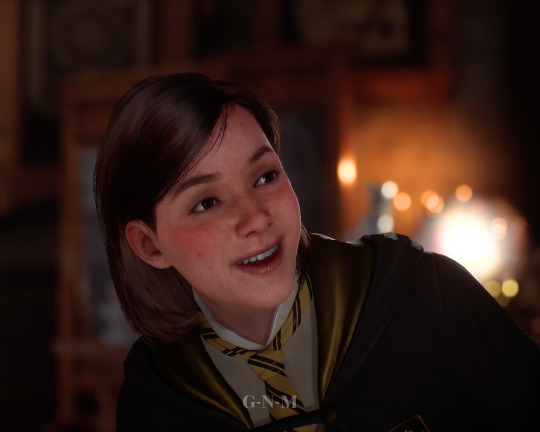

Everyone look at this cutie 😭💛
169 notes
·
View notes
Text
Whenever I see someone thinking Harry's and Ron's grades are average or the guys are a bit dumb, I know it's coming from someone very young and unfamiliar with the British grade system of the 80s. I've just seen people complaining that Hermione received one EE as if it is horrible. Not in this specific universe!
Rowling clearly based Hogwarts' grading system on O-levels and A-levels from the 1980s, when she went to school. At that time, there was no grade inflation yet (nowadays, almost half of the year receives an A, and they have even added an A* to better differentiate).
The number of A grades was restricted to 10% at most. Students even got into universities with BBC grades, and B used to be something to be proud of.
A, B, and C assured you that you could continue with the subject at A-levels reserved for university applicants. I've seen our transfer students freaking out because of a B even though it's exceeding the expected amount of knowledge.
Hermione not receiving one O is just her not outshining everyone else in a single subject. Harry and Ron receiving that many good passes while not even studying half as much as Hermione is a tremendous achievement.
Moreover, let's remember that grades are correlated with high executive functioning skills, not high intelligence or general ability. The grade distribution was not bell-shaped the way the IQ is, even in the 80s. And the canon is pretty clear that magical power, at least at the school level, isn't either. So, the Golden Trio is brilliant; it's not 2024; they are in the UK. Let's mind the context while analyzing old books.
148 notes
·
View notes
Text

My shrek-obsessed heart can't take this
34 notes
·
View notes